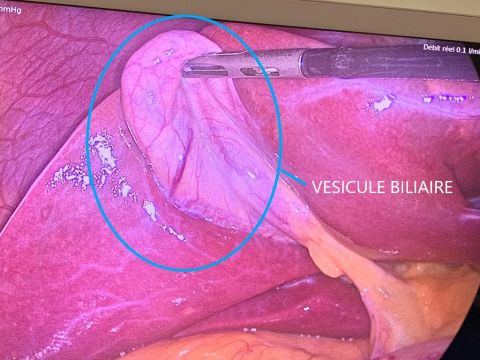News - 15/09/2021
The gallbladder is the reservoir of bile constantly secreted by the liver. Between meals it is "stored" in the gallbladder and empties into the intestine, contracting during feeding.
Sometimes, for reasons not well known, this bile "thickens" and forms stones that vary in size from a few millimeters to several centimeters. The predisposing factor is mainly female sex and obesity.
Most often these stones are asymptomatic and do not cause any problems, but they can block or infect the bile leading to an infection which can be serious and requires emergency surgery.
The only treatment is surgical removal of the gallbladder (apart from a general condition prohibiting intervention), in order to prevent the occurrence of complications. The simple excision of stones is not enough, the wall of the gallbladder also being involved in the formation of stones. Leaving the gallbladder in place (as was done in the past) exposes the patient to a very significant risk of recurrence.
The surgical removal of the gallbladder remains very simple, aside from complicated forms, it is performed laparoscopically, most frequently on an outpatient basis and requires a few days of medical leave.
RISKS OF GALLSTONE MIGRATION AFTER BARIATRIC SURGERY
Bariatric surgery is an increasingly common surgery for the treatment of severe obesity. Although it offers many benefits, including significant weight loss and improvement in obesity-related comorbidities, it is not without risks. Among these risks, is lithiasic migration, or the formation of gallstones, a postoperative complication that deserves special attention.
Causes
After bariatric surgery, the risk of developing gallstones increases due to several factors:
- Rapid weight loss, which is often a consequence of the surgery, can lead to cholesterol saturation of the bile, thus promoting the formation of stones.
- changes in gastrointestinal physiology can alter bile secretion and flow, further contributing to lithogenesis.
Symptoms
Gallstones can remain asymptomatic or cause symptoms such as abdominal pain, jaundice, or episodes of acute pancreatitis. In some cases, stones can migrate to the main bile ducts, causing obstruction and potentially serious complications.
Prevention and Management
Preventing the formation of gallstones may include the use of ursodeoxycholic acid, especially in patients with high-risk factors. If symptoms occur, a cholecystectomy may be necessary to remove the gallbladder and the stones which are present.
It is essential for patients who have undergone bariatric surgery to remain under regular medical supervision to detect and treat any complications related to lithiasic migration promptly.
For more information:
Cholecystectomie (In French)
Instagram: To see videos / reels regarding gallbladder surgery performed by Dr. Randone click on the icon in the bar of your screen or here.
♦ To make an appointment with Dr. Bruto Randone, ENGLISH SPEAKING Visceral and Digestive Surgeon, at the Clinique Internationale du Parc Monceau, 21 Rue de Chazelles, 75017 Paris, France, or at the Clinique Bizet, 23 Rue Georges Bizet, 75116 Paris, France, click on Contact.


